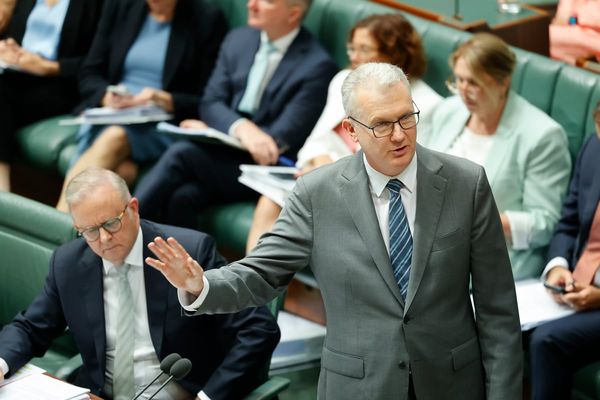
The “annual reporting season” for public companies is getting into full swing, and increasingly we are seeing ASX200 companies not just disclosing earnings but also releasing full annual reports with all remuneration data on the same day.
There was a time a few years back when the annual report and the remuneration report would be delayed to ensure the focus was only on profit. A shift in practice explains why last week we had a discussion about Commonwealth Bank (CBA) CEO Matt Comyn’s $10.4 million statutory pre-tax salary on the same day the bank released its $10.2 billion after-tax net profit.
After a Mark Humphries satire piece on 7.30, perhaps its board will return to the old system next year.
CBA dropped 11 different ASX announcements between 7.30am and 8.35am last Wednesday morning, spanning a ridiculous 883 pages. Everything else — including its 106-page climate report — got lost beyond the headline profit and salary numbers.
The one upside of speed-releasing the full remuneration report in the annual report is that it makes it easier for the five proxy advisers in the Australian market — ACSI, Ownership Matters, Glass Lewis, ISS and the Australian Shareholders’ Association — to scrutinise the pay data, engage with the company, and distribute their voting recommendations to shareholders well ahead of the annual general meeting (AGM).
Contrast all of this with what happens at Murdoch-controlled public companies.
News Corp and Fox Corp both released full-year results last week, but there was no information on exactly what the Murdoch men — only Rupert and Lachlan are left after Democrat-supporting James departed — took home, though the collective male Murdoch annual pay adds up to a staggering A$1.74 billion extracted over the past 24 years, averaging out to a shared $72.7 million in annual salary and bonus payments.
If Rupert Murdoch can offend a governance principle, he’ll usually find a way, meaning he’ll delay the release of the pay details for as long as possible and give the minimum possible notice on AGM details. This practice of announcing the date of the 2024 AGM before the 2023 meeting, as CBA did last Wednesday, hasn’t taken place at News Corp — the only information currently being provided is about last year’s meeting.
By current standards, over the past 24 years, the Murdoch men should’ve been paid around $274 million in annual salary and bonuses. But what about this estimated $1.5 billion extra that Murdoch men have received since 1998-99? This was the last year it was reasonable that Rupert Murdoch, then 67 years old, was only paid US$6.34 million — about the same as CBA’s Comyn in 2022-23 — to be executive chairman of News Corp.
At least Comyn fronted up to analysts last week. But despite being co-chairmen of News Corp, Lachlan and Rupert passed on last Thursday’s conference call with analysts and left the heavy lifting to CEO Robert Thomson. (As we now know, Rupert himself was too busy frolicking on a European gin palace with his new Russian squeeze.)
When batching the male Murdoch pay data from Fox and News Corp into five-year periods, it breaks down as follows:
Five years from 1998-99 to 2002-03: US$62.3 million
Five years from 2003-04 to 2007-08: US$166.8 million
Five years from 2008-09 to 2012-13: US$206 million
Five years from 2013-14 to 2017-18: US$433.5 million
Five years from 2018-19 to 2022-23: US$265.4 million, with final 2022-23 data to come.
That total of US$1.13 billion (A$1.74 billion) is just extraordinary, given the Murdoch family controls the boards of News Corp and Fox Corp through a voting gerrymander, giving the family more than 40% of the votes when they only own around 15% of the stock.
They wouldn’t be able to do this in Australia where gerrymanders are illegal and the law bans executives from voting on their own pay packets. As this list that tracks voting results at past Murdoch AGMs shows, the family trust has sometimes voted with its controlling stake to prevent the remuneration report from being formally defeated.
For instance, as Crikey noted at the time, the first-ever News Corp remuneration report vote in 2011 saw 432.6 million votes in favour and 232.1 million against. Strip out the family’s 317 million votes at that meeting and you have just 115.6 million in favour and a 66.7% against vote.
If that happened in an ASX-listed company, it would cause immediate reform as the offending executives wouldn’t be able to vote with their stock. If it happened again under our unique remuneration two-strikes regime, the whole board would have been spilled the following year.
Instead, sitting over there in Joe Biden’s Delaware (where all of this is entirely legal), the Murdochs have been able to keep paying themselves outrageous sums for the past 12 years and voting in favour of it every time.
Say what you like about the Packers, Kerry and James deserve much credit for never drawing an executive salary from public companies they controlled, such as PBL or Crown Resorts.
As for the Murdochs, with Forbes valuing the family’s wealth at around A$27 billion, the least Rupert and Lachlan could do is make timely disclosures of their latest pay packets.







